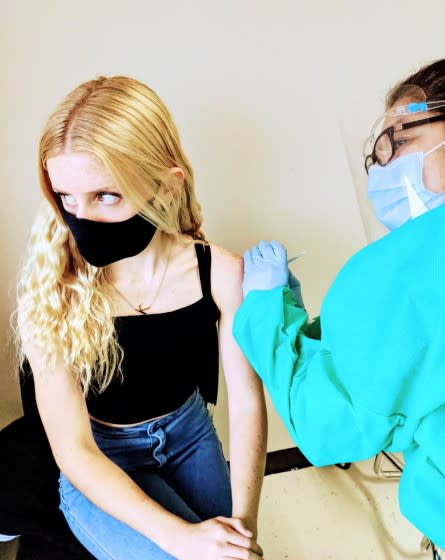Captain of Calabasas girls' basketball team participates in Pfizer COVID-19 vaccine trial

For more than a week, 16-year-old Kearston Stepenosky lobbied her parents in October to be allowed to participate in a trial run by Pfizer to see if its COVID-19 vaccine would be safe for teenagers. Her father, Dan, is superintendent of the Las Virgenes Unified School District and had volunteered to be a trial participant in August.
Kearston, captain of the Calabasas girls' basketball team, would not be denied. "I wanted to help," she said. "I had a lot of admiration for all the research that went into making the vaccine. I thought it was a great opportunity to step up and participate. There was no going back. I was pestering him."
"For 10 straight days, it was, 'How are you? Is this the day? I want to be in the trial,'" Dan recalled of his daughter's persistency.
The participant doesn't know if they receive the vaccine or a placebo. Dan never had any side effects when he was given his shot in August and another 21 days later. But Kearston finally received parental approval and took her shot at 10 a.m. on an October morning.
"I wasn't anticipating side effects," she said. "I've never had any reaction to a vaccine."
By 6 p.m., she was feeling chills. She said for five days she had aches and headaches but no fever. After the second shot three weeks later, her side effects lasted one day and were gone.
"I have absolutely no regrets," she said. "I'm incredibly grateful. Even if I had minor side effects, it's better than having COVID and endangering my family. It's very hectic right now and very sad, but at same time it's a really hopeful time. I have a lot of hope in this vaccine. One of the biggest reasons is being grateful it's going to make life easier for doctors, nurses and frontline workers. It's insane what they are having to navigate."
Kearston was chosen as a candidate to participate because she was doing conditioning as an athlete participating in workouts with others outside of her family. She still doesn't know if she received the vaccine or the placebo, but her reaction made her think she got the vaccine.
"My family had a big discussion whether it was good idea to get involved. 'This is your junior year in high school. You've got basketball, you're taking AP classes. It's going to hurt you if you have to miss school. You don't have a lot of room for error.' When I did have those negative side effects, my parents, were, 'Oh, no.' As it turned out it was temporary," Kearston said.
Kearston continues to work out on her own outside, shooting baskets and running in the hills. She's waiting to see if her sports season will resume. But she's most happy she has found a way as a teenager to contribute during a pandemic. She committed to 26 months of participating and monitoring while having occasional blood tests.
"My parents started mentioning, 'You're going to tell your grandchildren,'" Kearston said. "I didn't go into it thinking it would change my life. I went in thinking I want to help. This is something that's going to help. And when vaccines are available, take it."
This story originally appeared in Los Angeles Times.
